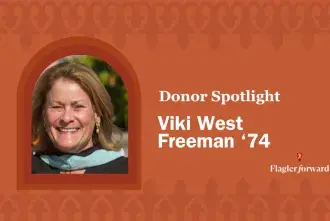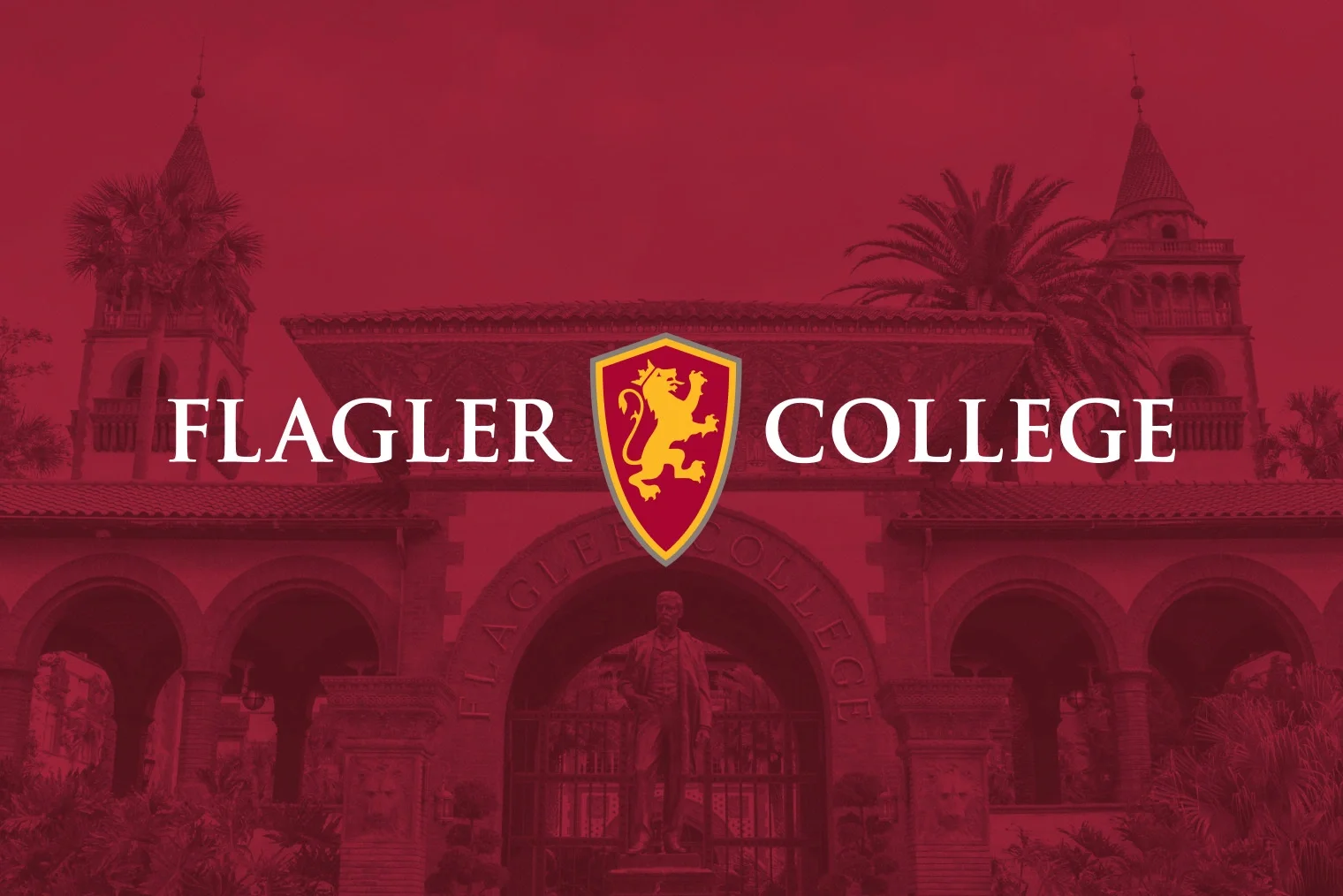An Environmental Sciences minor was born, and then a General Education science requirement was added. Today, the Coastal Environmental Sciences major is the third most popular on campus. The latest development on the horizon is a proposal for a biology degree program and a planned science facility. Developing the proposal is Dr. Gregory Miller, the new James W. Babcock and B. Teri Ludwick-Babcock Endowed Professor of Biological Sciences.
In this Q&A, Miller talked to us about the value of a biology degree in equipping students to address the state's most pressing issues — healthcare of an aging population and climate change, the tailored academic experience that will be unlike any other and the moment he knew science was a fascinating subject to behold.
Q: The proposed biology major aims to have, at full maturity, 400 students. This is a big change for the College, which has typically drawn students to non-science fields. Why is this change a good thing for Flagler?
Broadly speaking, STEM (Science Technology Engineering and Math) students experience an undergraduate degree rich in problem solving, data analysis, math skills and technical communication (both verbal and written). Because of this, nationally, STEM degrees tend to attract high school students with stronger backgrounds in math and science already. These students might major in biology, but they populate all of our Flagler classes from those in their minor to our general education offerings. The mission of Flagler College is to produce responsible and well-rounded future citizens. But, we have a responsibility to produce graduates that are competitive in today's labor market also. STEM majors have an advantage here. The Bureau of Labor Statistics and the National Center for Education Statistics both claim that STEM fields are the fastest growing, most needed, and highest paying future careers. The U.S. Office of Science and Technology Policy says the United States faces a “critical shortfall of STEM professionals” in the next decade. Currently, they estimate that there are three million jobs in the U.S. related to STEM that are either unfilled or are being filled by the international community. Florida sits squarely in the middle of two major future issues where STEM expertise will be necessary - healthcare of an aging population and climate change. Flagler College will be producing graduates that, depending on their curricular choices, will be capable of helping us face both of those challenges. Those graduates will work in influential fields and raise Flagler's future reputation for producing excellent scientists. Future students will hear more about our College and some will want to visit campus and see what all the fuss is about. Once the students get to our campus, whether or not they choose biology or coastal environmental science, some will decide on Flagler as a college destination.
Q: Why is biology such an important field for the College — and, by extension, the wider world?
Students with an undergraduate degree in biology represent the largest portion of students entering the medical profession (medicine, dentistry, pharmacy, physician's assistant programs) and those studying climate change and its effects on our planet. But biology graduates also often find careers in environmental law, the dozens of fields in biotechnology, science education, forensics, conservation, primary research positions, and through the U.S. government. Many additional students will consider Flagler College for their undergraduate education because of this degree. Those same students, upon their graduation, will be very sought after in an increasingly complex and integrated world.
Q: There's obviously a practical component—that of job security—for students pursuing a degree in biology. What about you? How did you come to choose the fields of biology and chemistry?
In the second grade, my grandmother sent me a book on astronomy. There were pictures of the Viking landers in the late 1970s. There will hills, clouds and rocks in the pictures…I thought, 'This is nowhere on Earth.' It was amazing. My first interest in science were the stars and planets. And when I was young, I had to take standardized tests — I did awful in subjects like English, but scored, like, 99 percent in math and science. I started college as an accounting major, but when I realized my interest in astronomy and biology, I decided to change my major. At my college, Northwestern State University of Louisiana, there was a NASA joint venture program that was funding STEM majors. I chose chemistry, and a biology major to go with it. My interest was in life on other planets, but I didn't understand the first thing about life on this planet. That explains the equal amounts of coursework I did in biology and chemistry.
Q: After attaining your Ph.D. in Chemistry from the University of Alabama in 2000, you joined Southern Oregon University. There, in addition to teaching, you helped create new science programs, served as pre-med advisor to students and helped design a remodel of the new science building. Why did you choose to come to Flagler?
When I interviewed for the job, I met with students for lunch one day. One thing I really noticed were the connections they talked about between faculty and students. That's what I was looking for. It was also a great match—my background is in biochemistry, and Flagler was needing more experience in chemistry, as they've been offering hybrid courses in environmental chemistry and aquatic chemistry. We're now talking about converting over to general chemistry with labs.
Q: What does Flagler need to fully roll-out a biology degree program?
As the classes get populated with students, we will need a new building to accommodate both coastal environmental science and biology students, modernize our laboratories and to meet safety requirements. As examples, we don't have enough fume hoods, safety shields, the proper air handling, or the correct lab bench materials to make a class like organic safe for students, staff and faculty. If we were to offer organic chemistry soon, we would have to do it off-site. A new facility will not only support the science program, but it could also be a chance for the college to model environmentally-sound building practices — it could be LEED certified (a sustainability rating system that stands for Leadership in Energy and Environmental Design). The new facility would be good for Flagler, and Flagler could be a guide for St. Augustine.
Q: The College's Coastal Environmental Science (CES) program is popular: Since its launch in 2013, it has grown to be the third most popular major on campus, with approximately 170 students declaring CES their major. How will the new biology major complement the existing CES program?
Our CES program already has a strong biology component to it. We've offered a minor in biology for years and have multiple elective courses that fall in the traditional biological realm (genetics, microbiology, evolutionary biology, zoology, etc.) So, a biology major is a natural step for the College. CES students will have more choices of biology electives to better complement their chosen career path; more classes to further their understanding of the interplay of our environment and living systems. Likewise, CES classes offer our biology students an entire array of applications for their biological knowledge. Lab equipment and instrumentation will have dual roles and the students will get to learn two or more different uses for the same instrument. In many ways, these two degrees offer two different ways of approaching and solving the same world problems. Just in the single year I have been employed at Flagler, I have had numerous students come up to me after class and ask questions about specific biological topics we touched on during the lecture. Over a dozen of these students have expressed a desire to have a new class offering that explores these topics in greater detail. I believe those students hint at an as-of-yet unseen reality: these two topics strengthen each other; they help explain and add meaning to each other. I think the faculty foresee many double majors and major/minor pairings between CES and biology.
Q: For students searching for colleges with biology programs, how will Flagler's stand out from others? What unique experience(s) can they expect to gain?
Our goal for biology is to produce highly-trained scientists with amazing student outcomes (job placement, graduate school acceptances and high levels of professional school matriculation). I'll start with the fact that Florida is a great place to study living systems. Ocean, coastal and terrestrial ecosystems lead to a diversity of life that is unmatched almost anywhere in the United States. A key feature of our biology degree will be a requirement that our students do undergraduate research in their junior and/or senior years. This is true of many colleges and universities. What makes Flagler unique is that this undergraduate research will be done in small teams or one-on-one directly with our faculty. This is not true at many schools. This gives students the opportunity to learn science methods and techniques directly from faculty who specialize in these fields; there is no better way to learn science than by doing it. The students feel like an integral part of the program, get hands-on experience, and many will get published in scientific journals before or soon after they graduate. Existing Flagler science faculty already have established research projects in places like Belize, Bermuda and various Caribbean islands. On the right path, students will be “forced” to spend time in these locations as part of their education. What a fantastic experience. The biology curriculum designed for Flagler students is also very unique. The degree is going to be both flexible and rigorous. Flexible in that students get to choose a path through biology that best suits their career aspirations. The three possible degree paths include cell and molecular biology, organismal biology or conservational biology. Each degree path will have multiple course offerings to choose from. The degree is further flexible in allowing a student to choose the math classes that best suit their needs. While a student interested in eventually working in healthcare might choose to satisfy their math requirements with more calculus, another student interested in population biology might benefit from more statistics-type classes. A rigorous degree is one that is demanding and sets a high bar for its students. It is one that makes students excellent problem solvers and critical thinkers. When our alumni visit campus in the future, we want them to say that Flagler prepared them as well as or better than the schools their future classmates or coworkers attended.
Program Requirements
The degree will likely require:
- A year of general chemistry (almost universally common among biology degrees), one semester of organic chemistry (somewhat common), and one semester of biochemistry (uncommon).
- A minimum of three semesters of mathematics (uncommon) and at least one semester of physics (fairly uncommon).
- The biology degree at Flagler also will train students to communicate in the scientific style (both written and verbal). It is one of the few biology degrees that include a science communication class (very uncommon) as well as the more traditional presentations associated with a student’s senior research project.



